
Paleoceanography and Paleoclimatology
Scope & Guideline
Illuminating the Past to Understand Our Future
Introduction
Aims and Scopes
- Paleoenvironmental Reconstructions:
The journal emphasizes the reconstruction of past environments using various proxies, including isotopes, sediment analysis, and fossil records to understand historical climate and oceanographic conditions. - Integration of Multidisciplinary Approaches:
Studies often incorporate methods from geology, biology, chemistry, and climate modeling, promoting a holistic understanding of the interactions between ocean and climate systems over geological timescales. - Focus on Climate Change Dynamics:
Research published in the journal frequently addresses the dynamics of past climate changes, particularly their causes and effects, providing insights into natural climate variability and anthropogenic impacts. - Application of Advanced Technologies:
The use of cutting-edge technologies such as machine learning, high-resolution geochemical analyses, and advanced statistical methods is a consistent theme, enhancing the accuracy and depth of paleoclimatic reconstructions. - Global and Regional Climate Insights:
The journal covers studies that provide insights into both global climate patterns and regional climate phenomena, thus bridging the gap between localized studies and global climate trends.
Trending and Emerging
- Machine Learning Applications:
Recent publications reflect a surge in the application of machine learning techniques for analyzing complex datasets, enhancing the ability to reconstruct past climates and predict future trends. - Interdisciplinary Studies Linking Climate and Ecosystems:
There is a growing trend toward studies that link paleoclimate data with ecological impacts, examining how historical climate changes have affected marine and terrestrial ecosystems. - Focus on Anthropogenic Influences:
An increasing number of papers are addressing the impacts of human activities on historical climate patterns, providing insights into how current changes may be influenced by past anthropogenic effects. - High-Resolution Proxy Data:
Emerging studies utilize high-resolution proxy data to gain finer temporal insights into climate variability, allowing for more detailed reconstructions that can inform current climate models. - Climate Feedback Mechanisms:
There is a rising interest in understanding feedback mechanisms within the climate system, particularly how past climate events can inform our understanding of current climate dynamics.
Declining or Waning
- Traditional Geological Methods:
There is a noticeable decline in the use of purely traditional geological methods without integration of modern techniques, as the field increasingly favors interdisciplinary approaches that combine various scientific disciplines. - Focus on Short-Term Climate Events:
Research centered on very short-term climate events or localized phenomena is becoming less prevalent compared to studies that address long-term trends and broader climatic shifts. - Paleoceanographic Studies Lacking Climate Context:
Papers that focus solely on paleoceanographic aspects without tying them to broader climate implications or models are less frequently published, indicating a shift towards more integrative studies that consider climate implications. - Single Proxy Studies:
There is a reduction in the publication of studies relying on single proxies for paleoclimate reconstruction, as the trend shifts towards multi-proxy approaches that provide a more comprehensive view of past environments. - Overly Specialized Research Topics:
Highly specialized topics that do not connect to broader climate or oceanographic narratives are less common, as researchers increasingly aim for studies that contribute to wider scientific discussions.
Similar Journals
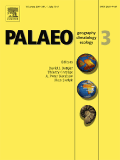
PALAEOGEOGRAPHY PALAEOCLIMATOLOGY PALAEOECOLOGY
Connecting Geological Records with Contemporary Ecological DynamicsPalaeogeography, Palaeoclimatology, Palaeoecology, published by Elsevier and accessible via ISSN 0031-0182 (print) and E-ISSN 1872-616X (online), stands as a pivotal journal in the fields of Earth-Surface Processes, Ecology, Evolution, Behavior and Systematics, Oceanography, and Paleontology. With an impressive Impact Factor and ranking in the top quartile (Q1) across multiple categories, this journal facilitates cutting-edge research that explores the intricate relationships between past climates, environments, and ecosystems. Its scope encompasses a wide array of studies focusing on the geological and biological records that inform our understanding of contemporary ecological dynamics. Key objectives include advancing knowledge in palaeoecology and enriching discourse around climate change through rigorous research contributions. The journal's dedicated commitment to publishing high-quality, peer-reviewed articles makes it an invaluable resource for researchers, professionals, and students alike, providing insights essential for probing the factors shaping our planet's history. Positioned in the Netherlands and continuing its tradition of excellence since 1965, the Palaeogeography, Palaeoclimatology, Palaeoecology journal remains at the forefront of interdisciplinary research that bridges the past and future.

JOURNAL OF THE GEOLOGICAL SOCIETY OF INDIA
Connecting regional insights with global geological trends.JOURNAL OF THE GEOLOGICAL SOCIETY OF INDIA, published by Springer India, serves as a pivotal platform for researchers and practitioners in the field of geology. Established in 1979, this journal has been instrumental in advancing geological research throughout India, showcasing both regional studies and cutting-edge global research. With its Category Quartile ranking of Q3 in the geology category for 2023, and a significant Scopus rank of 171 among 321 journals in Earth and Planetary Sciences, it remains a respected source of scholarly activity. The journal is dedicated to the dissemination of original research articles, reviews, and case studies that encapsulate the dynamic scope of geological science, thus contributing to the understanding of geological phenomena. Although currently not offering open access, the journal maintains a commitment to high-quality scholarship and aims to engage a diverse readership, enhancing the knowledge and practice of geology across various disciplines.

Ocean Science
Connecting Scholars through Oceanic InsightsOcean Science, published by COPERNICUS GESELLSCHAFT MBH, stands as a premier Open Access journal in the fields of Oceanography and Paleontology, with a commendable impact factor that highlights its influence in the scientific community. Since its inception in 2005, Ocean Science has provided a vital platform for the dissemination of innovative research and discoveries, boasting prestigious rankings of Q1 in both Oceanography and Paleontology categories as of 2023, along with impressive Scopus rankings (7th in Paleontology and 28th in Oceanography). Based in Göttingen, Germany, the journal's commitment to open access ensures that groundbreaking research is readily available to a global audience, fostering knowledge sharing and collaboration among academics, professionals, and students alike. As it converges towards its 20th anniversary in 2024, Ocean Science continues to be an essential resource for those dedicated to advancing our understanding of the marine environment and its geological history.
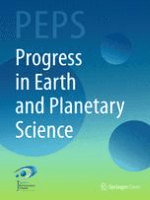
Progress in Earth and Planetary Science
Connecting researchers for a sustainable planetary future.Progress in Earth and Planetary Science is a premier open-access journal published by Springer, dedicated to advancing the field of Earth and planetary sciences. Since its inception in 2014, this journal has emerged as a prominent platform, achieving a Q1 ranking in the Earth and Planetary Sciences category, reflecting its high impact and rigorous peer-review process that ensures the highest quality of published research. With its broad scope encompassing diverse subfields within the Earth sciences, the journal aims to foster interdisciplinary collaboration and innovation among researchers, professionals, and students. The journal's commitment to accessibility through its open access model promotes the dissemination of knowledge globally, allowing critical research findings to be shared widely within the scientific community. Located in the United Kingdom, Progress in Earth and Planetary Science continues to play an essential role in shaping the future of Earth and planetary research from 2014 to 2024 and beyond.
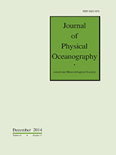
JOURNAL OF PHYSICAL OCEANOGRAPHY
Unveiling the Mysteries of Marine EcosystemsJOURNAL OF PHYSICAL OCEANOGRAPHY, published by the American Meteorological Society, stands at the forefront of the oceanographic research domain, with a distinguished history dating back to 1969. As a crucial resource for researchers, professionals, and students, this journal focuses on the physical aspects of our oceans, facilitating the dissemination of innovative studies that enhance our understanding of ocean dynamics, climate interactions, and marine ecosystems. With an impressive impact factor and a Q1 ranking in Oceanography, it ranks 30th out of 145 journals in the Earth and Planetary Sciences category (Scopus), placing it in the 79th percentile of its field. Its commitment to high-quality, peer-reviewed content ensures that the latest advances in oceanographic science are accessible to a global audience. Although the journal does not currently offer open access options, it remains a vital platform for cutting-edge research that shapes the future of oceanographic science and its applications.
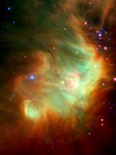
Annual Review of Earth and Planetary Sciences
Pioneering Research in Earth and Celestial StudiesAnnual Review of Earth and Planetary Sciences is a leading scholarly journal published by Annual Reviews, dedicated to advancing our understanding of the dynamic processes governing the Earth and its celestial companions. With ISSN 0084-6597 and E-ISSN 1545-4495, this esteemed journal, established in 1976, has consistently provided comprehensive reviews that synthesize cutting-edge research across various disciplines, including astronomy, astrobiology, geology, and planetary science. Notably, the journal has achieved a remarkable position in the academic landscape, ranking in the Q1 quartile across multiple categories, including Astronomy and Astrophysics and Earth and Planetary Sciences, with Scopus rankings placing it at the forefront of these fields. The journal's commitment to facilitating open access to critical scientific advances, though not fully open, allows for maximum reach within the research community. Researchers, professionals, and students alike can benefit from the high-impact articles designed to foster collaboration and innovation within the fields of earth and planetary science.
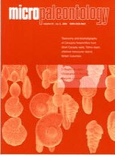
MICROPALEONTOLOGY
Unveiling the Secrets of the Past, One Microfossil at a TimeMICROPALEONTOLOGY is a prominent journal dedicated to advancing the field of paleontology, published by MICRO PRESS. With an ISSN of 0026-2803 and an E-ISSN of 1937-2795, this esteemed publication has been a vital resource since its inception in 1979, continuing to influence the field through 2024. The journal ranks within the Q2 category for Paleontology, highlighting its relevance and quality in the academic community. Notably, it holds a Scopus rank of #41 out of 113 within the Earth and Planetary Sciences field, placing it in the 64th percentile, indicative of its significant impact. Although not an open-access journal, MICROPALEONTOLOGY remains committed to disseminating crucial research findings, making it an essential platform for researchers, professionals, and students dedicated to exploring the intricacies of microfossils and their implications for understanding past environments. With its strategic focus and rigorous peer-review process, this journal plays a critical role in bridging past geological events with contemporary scientific inquiries.
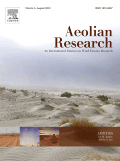
Aeolian Research
Unraveling Aeolian Mysteries for a Sustainable FutureAeolian Research, published by ELSEVIER SCI LTD, is a leading academic journal in the fields of Earth-Surface Processes and Geology, holding a prestigious Q1 category ranking in both disciplines as of 2023. With an ISSN of 1875-9637 and an E-ISSN of 2212-1684, this journal is pivotal for researchers and scholars interested in the intricate dynamics of aeolian processes and their implications for geology and environmental science. Covering a span of research from 2009 to 2024, it regularly disseminates high-impact studies that explore the interactions between wind-driven processes and sediment transport, erosion, and landscape evolution. With a Scopus ranking of #34 and #20 in their respective categories, Aeolian Research serves as an essential resource for advancing knowledge in Earth and Planetary Sciences. While currently not an open-access journal, it delivers compelling insights that are relevant to contemporary challenges in geology and environmental management.
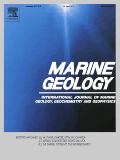
MARINE GEOLOGY
Charting New Frontiers in Marine Geological Research.MARINE GEOLOGY, published by Elsevier, is a premier journal dedicated to advancing the understanding of marine geological processes and their interactions with the Earth's systems. With an ISSN of 0025-3227 and an E-ISSN of 1872-6151, this esteemed journal has been a vital resource for researchers and professionals since its inception in 1964. The journal is recognized for its high impact, with commendable rankings, including Q1 in both Geology and Oceanography, and Q2 in Geochemistry and Petrology according to its 2023 category quartiles. With a Scopus rank within the top percentiles in various fields, MARINE GEOLOGY offers a platform for original research, critical reviews, and significant advancements in the field, covering topics ranging from sedimentology to geochemical processes in marine environments. Although it does not operate under an open-access model, its rigorous peer-review process ensures high-quality publications that contribute to our understanding of oceanic and geological sciences. Researchers, students, and professionals alike will find MARINE GEOLOGY to be an essential resource for collaboration and discovery within the vast field of marine science.
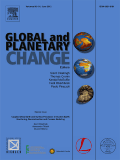
GLOBAL AND PLANETARY CHANGE
Illuminating the Path to Global Environmental SolutionsGLOBAL AND PLANETARY CHANGE, published by Elsevier, is a premier international journal focused on the critical issues surrounding environmental science, climate change, and planetary dynamics. Since its inception in 1989, this journal has established itself as a leading voice in the field, currently holding a prestigious Q1 ranking in both Global and Planetary Change and Oceanography as of 2023. With a remarkable influence reflected in its Scopus rankings—15th in Earth and Planetary Sciences and 34th in Global and Planetary Change—it serves as an essential platform for researchers, professionals, and students. The journal provides a comprehensive examination of cutting-edge research findings and innovative developments that address the urgent challenges facing our planet. Although it is not an Open Access journal, it remains a vital resource for anyone keen to contribute to or stay informed on the ever-evolving discourse of global environmental change, promoting sustainable solutions for the future.